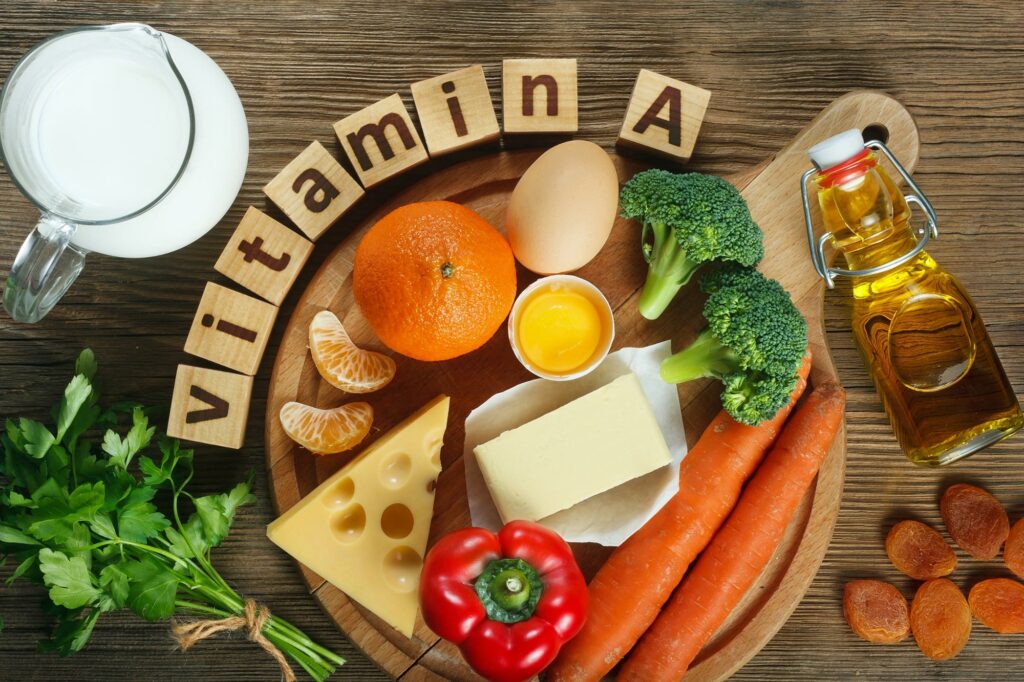Introduction to Vitamin A
Vitamin A is a crucial nutrient that plays a vital role in maintaining vision, immune function, and skin health. It exists in two forms: preformed vitamin A (retinoids) found in animal products, and provitamin A carotenoids (like beta-carotene) found in plant-based foods.
Importance of Vitamin A
Vitamin A supports:
- Vision: Essential for night vision and overall eye health.
- Immune Function: Helps maintain the integrity of the skin and mucous membranes, which act as barriers to bacteria and viruses.
- Skin Health: Supports skin regeneration and overall health.
Sources of Vitamin A
Animal Sources
- Liver: Particularly beef liver, which is rich in retinol.
- Fish Liver Oils: Cod liver oil is a concentrated source of retinol.
- Dairy Products: Milk, cheese, and butter contain some retinol.
Plant Sources
- Dark Leafy Greens: Spinach, kale, and Swiss chard provide beta-carotene.
- Orange and Yellow Vegetables: Carrots, sweet potatoes, and pumpkins are rich in beta-carotene.
- Fruits: Mangoes, apricots, and cantaloupe also contain beta-carotene.
Fortified Foods
- Some foods like breakfast cereals, margarine, and plant-based milk alternatives are fortified with vitamin A.
Recommended Daily Intake
The Recommended Dietary Allowance (RDA) for vitamin A varies by age and gender:
- Adult Men: 900 micrograms per day (mcg/day)
- Adult Women: 700 mcg/day
- Pregnant Women: 770 mcg/day
- Breastfeeding Women: 1,300 mcg/day
Maximizing Vitamin A Absorption
To enhance absorption of vitamin A:
- Consume vitamin A-rich foods with healthy fats.
- Cook vegetables lightly to preserve nutrients.
- Pair vitamin A sources with foods high in vitamin C.
FAQs About Vitamin A
What are the signs of vitamin A deficiency?
Vitamin A deficiency may cause night blindness, dry skin, and impaired immune function.
Can you get too much vitamin A?
Yes, excessive intake of preformed vitamin A (retinol) can be toxic, leading to symptoms like nausea, dizziness, and in severe cases, liver damage.
Are supplements necessary if I eat a balanced diet?
Most people can meet their vitamin A needs through diet alone. Supplements should be taken under medical supervision to avoid toxicity.
Should I choose retinol or beta-carotene?
Both forms are beneficial. Retinol from animal sources is readily absorbed, while beta-carotene from plant foods is converted into vitamin A as needed by the body.
Are there risks associated with beta-carotene supplements?
High-dose beta-carotene supplements have been linked to an increased risk of lung cancer in smokers. It’s best to obtain beta-carotene from food sources.
Can I get enough vitamin A from plant-based sources?
Yes, plant-based sources like carrots, spinach, and sweet potatoes provide ample beta-carotene, which the body converts into vitamin A.
How can vegetarians and vegans ensure they get enough vitamin A?
They can rely on plant-based sources of beta-carotene and consider fortified foods like plant-based milk alternatives.
Are there any cooking methods that preserve vitamin A?
Light cooking methods such as steaming or sautéing help retain vitamin A content in vegetables.
Which foods are best for improving skin health with vitamin A?
Foods rich in vitamin A, like sweet potatoes and spinach, promote skin regeneration and overall health.
Can vitamin A help with acne?
Vitamin A plays a role in skin health, but specific benefits for acne should be discussed with a dermatologist.
Conclusion
Increasing your vitamin A intake naturally is achievable through a balanced diet rich in colorful fruits, vegetables, and animal products. By understanding the sources and benefits of vitamin A, you can support your vision, immune system, and overall health effectively.
- Retinol Peel Near Brockham, Surrey - June 1, 2025
- Neck Line Filler Treatment Near Hook, Surrey - May 31, 2025
- Nasolabial Fold Fillers – Marionette Lines Near West Horsley, Surrey - May 30, 2025

